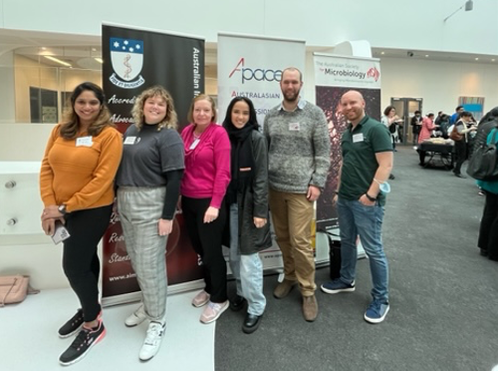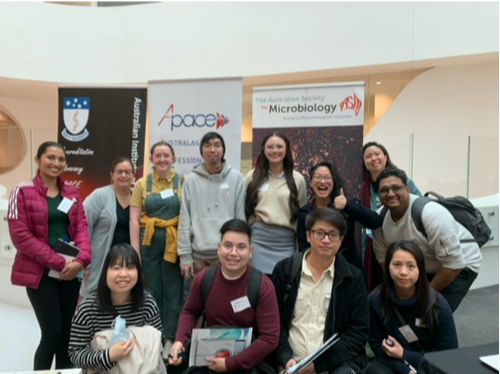Event Recap - 2024
ASM ECR Awards Night
The ASM Vic Branch ECR night was held on April 15th, where six ECRs competed for the opportunity to attend the ASM national conference in Brisbane where they will compete in the national competition.
- ASM ECR awardee: Remy Young - Hudson Institute

The ASM Vic Branch teaching and clinical awards were also presented on the night, where the winners will have their expenses covered for their trips to ASM EduCon and CliniCon respectively.
- ASM Vic Branch Teaching Awardee: Katelyn Mroczek - LaTrobe University
- ASM Vic Branch Clinical Awardee: Lilian Haines - Monash Medical

ASM Nancy Millis Awards Night
The annual ASM Vic Branch Nancy Millis Student Awards were held on Thursday 14th March 2024 at Monash University. This year, 78 attendees (both in person and virtually via zoom) joined us for an fascinating night of talks from our student microbiologists.
The prestigious ASM Nancy Millis Student Award is a long-running prize awarded to the best student presenting research carried out as part of a PhD or Masters by Research, with each State nominating their top representative to speak at the National conference. Following a highly competitive abstract selection process, our six selected finalists were: : Jayson Rose (La Trobe University), Sara Di Simone (Hudson Institute, Monash University), Hanwen (Rex) Hou (MCRI), Hugh Cottingham (Monash University), Sher Main Tan (University of Melbourne, The Peter Doherty Institute for Infection and Immunity) and Leo Kan (Monash University). Our congratulations goes to:
- ASM Nancy Millis award 2nd place: Sara di Simone - Longitudinal culturing of the early life human microbiome reveals temporal and spatial differentiation between the respiratory tract and gut
- ASM Nancy Millis award 1st place: Hugh Cottingham - Characterisation of bacterial pathogens using CRISPR-Cas9 enrichment and Oxford Nanopore sequencing
In addition to the Millis award competition, ASM Vic Branch also awards the VIC Branch Award (for Honours and Masters by Coursework students). This year we had three competitors for this prize: Alexandra Blejusca (University of Melbourne, The Peter Doherty Institute for Infection and Immunity), Georgie Gilmore (Monash University) and Jessica Owen (La Trobe University). We would like to congratulate:
- Vic branch prize: Georgie Gilmore - CdspoCR_R disruption impairs CdSpoCR-mediated cephamycin resistance in Clostridioides difficile
As winners of these awards, Georgie, Sara and Hugh will receive registration to ASM Brisbane 2024, and travel funds for accommodation and flights. Hugh will also present his research in a dedicated symposium session at ASM Brisbane, with the other state winners of the Nancy Millis award.
Congratulations to all students who competed for prizes on the night – all presentations were of extremely high quality, making judging a incredibly difficult task!
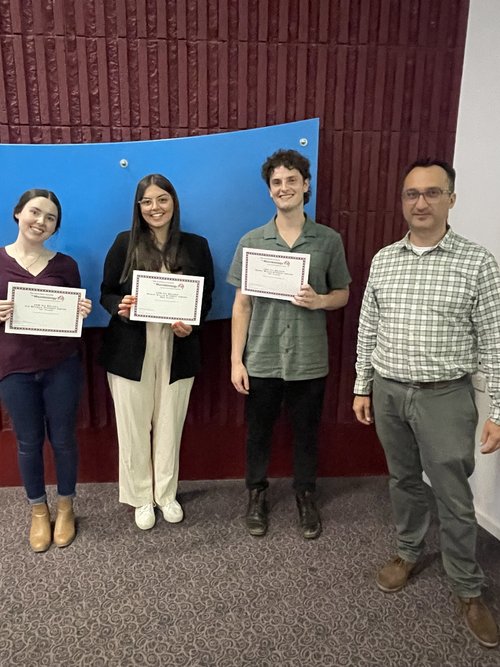
It was also our pleasure to present the Undergraduate Academic Student prizes for 2023 on this evening. These awards are presented to the top scoring student from participating Institutions across Victoria, in recognition of their academic achievements in the previous year. Our 2023 winners were:
Federation University
• Year 3 (Science): Samuel Isaac Varjabedian
La Trobe University (Bundoora)
• Year 2 (Science): Laura Viola • Year 3 (Science): Phillip Bottomly
Monash University
• Year 2 (Science): Daniela Lambrechts • Year 3 (Science): Luca Petterlin
RMIT University
• Year 2 (Biomedical Science): Alex Ambrosi • Year 2 (Food Microbiology): Declan Hayton • Year 3 (Medical Microbiology): Maneath Pov • Year 3 (Industrial Biotechnology): Finlay Hayton
The University of Melbourne
• Year 2 (Science): Kayleigh Schroder • Year 2 (Biomedicine): Rithu Tennekoon • Year 3 (Combined): Taylah Phabmixay
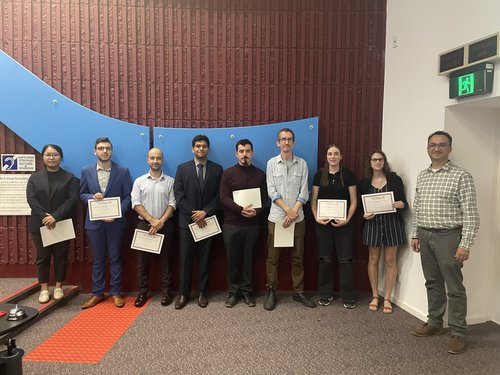
ASM Vic Branch would like to acknowledge the contribution of all who made the evening a success, including our judges (Bliss Cunningham, Rhys Dunstan and Rachael Lappan), all our competitors for their outstanding presentations, and of course our audience.
We hope to see you all next year!
Inaugural Mirobial Mixer
The inaugural ASM Vic Branch Microbial Mixer event was held at the Riverland Bar on the 15th Feb 2024. The mixer brought together ~28 microbiology enthusiasts for networking, collaboration and drinks. From seasoned researchers to aspiring students, microbial aficionados exchanged ideas, forged connections, and fostered camaraderie. Stay tuned for future mixers to 'culture' a positive and inclusive microbiology community!
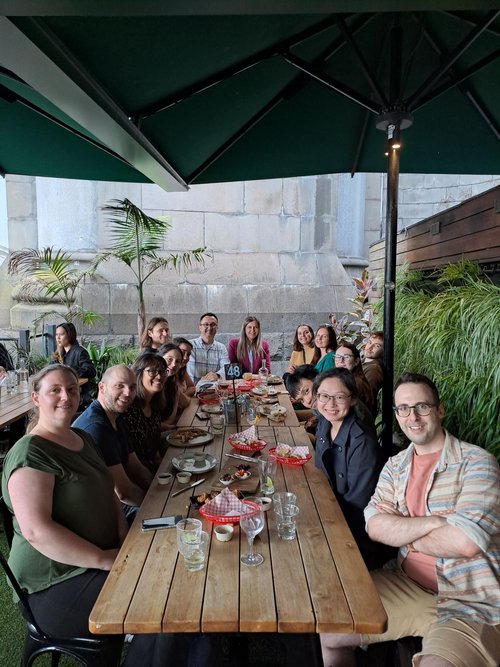
News From The Hospitals
Isabelle Gemmell opened the evening of "News from the Hospitals" at the Royal Children's Hospital with her captivating presentation on Cladophialophora bantiana, a rare fungal pathogen causing cerebral phaeohyphomycosis, a topic that earned her recognition with a prestigious prize. Her detailed description underscored the critical importance of early diagnosis and targeted treatment strategies in combating cerebral infections caused by this elusive fungus.
Julio Bento from Monash Health followed with an illuminating discussion on an unusual cerebrospinal fluid isolate of Enterococcus linked to strongyloides hyperinfection, shedding light on the complex interactions between parasitic infestations and secondary bacterial infections, particularly in meningitis cases.
Dr. Yara-Natalie Abo continued the session, addressing the escalating public health challenge of invasive Group A Streptococcus infections. Her epidemiological analysis provided a sobering overview of the increasing incidence and patterns of these infections, emphasizing the urgent need for enhanced surveillance and intervention strategies.
Nimesha Ratnayaka-Gamage, representing Dorevitch Pathology, presented compelling case studies on the unexpected isolation of Campylobacter fetus from blood cultures, prompting discussions on diagnostic challenges and implications for patient management.
Sampada Scott, from Austin Pathology, concluded with insights into the zoonotic potential of brucellosis transmitted through unpasteurized dairy products. Scott's presentation underscored the importance of stringent food safety measures and clinical vigilance in preventing such infections.
The evening saw a robust turnout of microbiology professionals, fostering lively discussions and highlighting collaborative efforts to address complex infectious disease scenarios. Attendees were left eagerly anticipating the next event to continue advancing scientific exchange in microbiology. The success of the evening was made possible by the generous support of Biomerieux, whose sponsorship facilitated this invaluable platform for global scientific exchange.
By Jay Chakrabarti.
AIMS/ASM Behind the Lens: Ocular Microbiology
On Saturday, August 3rd, the AIMS/ASM joint workshop was held at the prestigious Peter Doherty Institute Auditorium in Melbourne. While the city enjoyed pleasant weather outside, the focus inside was on the intricate world of ocular microbiology. The event drew 84 attendees, who were greeted with a warm reception, ample networking opportunities, and a delightful spread of refreshments before engaging in a day of enlightening discussions and case studies. I was thrilled to win the prize for an ASM sponsored attendance at the ASM/AIMS “Behind the Lens: Ocular Microbiology” event.
Dr. Harsha Sheorey opened the session with an engaging introduction, setting the stage for an in-depth exploration of ocular structure and their respective infections. His remarks provided a valuable overview of the role of microbiology in ophthalmology and outlined the day's agenda.
Dr. Helen Riad then took the floor to discuss specimen collection. She highlighted the challenges of obtaining adequate tissue and volume from ocular samples, which can significantly impact diagnostic accuracy and treatment decisions. Dr Riad offered practical tips and best practices for overcoming these challenges effectively.
Following Dr. Riad, Dr. Harry Birrell and Dr. Sugapriya Ravichandran presented a series of intriguing endophthalmitis cases, including a notable case of disseminated infection with ocular involvement in an immunocompromised patient. Their discussion addressed various clinical presentations, diagnostic hurdles, and treatment strategies, providing a comprehensive look into this severe ocular infection through real-world examples.
After a refreshing tea break, Dr. Vanessa Leung and Dr. Helen Riad next focused on corneal infections. They examined the pathogens responsible for corneal diseases, discussed diagnostic approaches, and explored treatment options, offering a thorough overview of corneal infection management.
Chandra Kant (Medical scientist, St Vincent’s Pathology) then addressed the bacteriology aspects of ocular infections. His talk highlighted major bacterial pathogens, their identification, and the significant impact of bacterial infections on ocular health.
Acute Retinal Necrosis (ARN) and toxoplasmosis, was discussed by Dr. Vivian Kuang covering clinical features, diagnostic methods, and treatment options for these challenging retinal conditions.
Dr. Darren Jardine (Principal scientist, St Vincent’s Pathology) provided valuable insights into virology and molecular diagnostics, focusing on the latest advancements in molecular techniques and their application in diagnosing viral ocular diseases, reflecting the ongoing evolution in molecular diagnostic practices.
Following a substantial lunch break, Josh Griffin (Medical scientist, St Vincent’s Pathology) presented on the mycology aspects of ocular infections. His talk offered a comprehensive view of fungal pathogens, including their identification and treatment strategies, which are crucial for managing fungal infections of the eye.
We then had an insightful and comprehensive comparison given by Dr. Victoria Madigan who compared antimicrobial lab testing standards: CLSI versus EUCAST. Dr. Madigan’s discussion provided a deeper understanding of these guidelines and their implications for managing ocular infections effectively.
The final sessions of the day focused on the management of endophthalmitis at RVEEH. Dr. Penelope Allen and Dr. Michael Lai presented protocols for handling endophthalmitis, corneal infections, and lacrimal disorders. Their practical guidance on treatment and patient management strategies brought the days of in-depth learning to a close.
As the event concluded, Patricia Szczurek (AIMS organising committee) from Austin health extended heartfelt thanks to all the speakers, attendees and organisers. Her closing remarks celebrated the day's rich discussions and the collaborative spirit that made the event a success.
By Anupama Anurenj
Visting Speakers Program - Prof Colin Hill
Prof Colin Hill touched down in Melbourne on the 4th of August at the conclusion of his Australian tour after being a keynote speaker at Viruses of Microbes and travelling to Brisbane and Adelaide as part of the Visiting Speakers Program (VSP).
Prof. Hill gave a seminar at the Peter Doherty Institute on Monday the 5th of August entitled “Bacteriophage and bacteria, dance partners in an evolutionary SAMBA” where he demonstrated the symbiotic relationship between bacteria and their phages, and the necessity of bacteriophage presence in the human microbiome.
The evening started with some delicious food courtesy of iPantry and networking between registrants and our speaker, who was very engaging to talk to. Prof Hill’s talk was of course the star of the show, his presentation of work was incredibly intriguing, and well delivered, and it was all too soon that the hour was up!
With Melbourne the last stop on his tour, Prof Colin Hill was then off to return to Cork, Ireland where he is a leader in his field. We look forward to the next time he returns to Australia.
Trivia Night
On the 5th September 2024, the Victorian branch of the Australian Society for Microbiology held its 13th annual Trivia Night at Ramblers Ale Works (96 Riversdale Road, Hawthorn VIC 3122). A total of 6 teams representing the Peter Doherty Institute (PDI), The University of Melbourne, Monash University, The Hudson, and Murdoch Children’s Research Institute (MCRI) competed across 3 rounds of trivia, hosted by Monash University Microbiology Postgraduate Society (MUMPS).
Between the three rounds, we played table games comprising a “Who Am I?” and “The price is right”. At the end of the night, 1 point separated first place to third place, and we needed a tie breaker question: “What is the name of the fungus in ‘The Last of Us’?”.
In the end, “McDoing Better” (34 points) won the tie breaker question and took all the glory. “McTrying Our Best” came last place in 2023 and with a subtle name change came out on top this year.

For the second year in-a-row, second place went to “We pneu that” (34 points), who called themselves “HBA (Half Baked Answers)” last year.

Third place went to Zahra’s disciples (33 points).

Fourth place to “That’s Not PC2” (29 points), Fifth place to “Lysis to Kill” (27 points), and Last place went to “3 ½ Asians” (21 points).

The questions were particularly hard this year, one question which no one guessed correctly was: “In the film ‘Osmosis Jones’, what is the name of the nightclub?”
Special thanks for the evening must go to: • MUMPS, who wrote the questions, but in particular, Alex Hall, Tom Bruer, and Genevieve Samuel, who jointly MCed for the night. • Ramblers Ale Works, for keeping us well-fed and hydrated throughout the evening!
AIMS Award: The Young Scientist Award 2024
ASM Vic Branch Committee Member Mikayla Kingston wins AIMS Award: "The Young Scientist Award 2024"
Mikayla Kingston was last month awarded by AIMS The Young Scientist Award for 2024. It is awarded for scientific endeavour in the field of Medical laboratory science in Victoria.
Mikayla is an ASM Vic Branch committee member and her commitment to professional development and scientific dissemination is exemplified by her organisation and chairing of joint AIMS and ASM microbiology events in recent years. Additionally, she is key to coordinating the biannual ASM "News from the Hospitals" events, a key platform for sharing knowledge across Melbourne's healthcare institutions.
Mikayla has been a driving force in the professional microbiology community, serving as an ASM Committee member for the Vic Branch since 2022 and playing a pivotal role in the CliniCon National Meeting. Her expertise in microbiology has been invaluable in training staff and students at Northern Pathology Victoria since 2019, ensuring the next generation of scientists are well-prepared for their future careers. Her leadership extends beyond the laboratory, as she has chaired sessions at CliniCon ASM National in both 2022 and 2023, highlighting her collaborative and encouraging approach with her peers.
Mikayla Kingston is a highly deserving candidate for the AIMS Vic Branch Young Scientist Award. Her contributions to Medical Laboratory Science, leadership in professional development, and commitment to microbiology make her a commendable scientist and mentor.
Congratulations!

Event Recap - 2023
Trivia Night
On 19th September 2023, the Victorian branch of the Australian Society for Microbiology held its 12th annual Trivia Night at The Imperial Hotel. A total of 7 teams representing the Peter Doherty Institute (PDI), The University of Melbourne, Monash University, La Trobe University, RMIT University, The Royal Children’s Hospital (Melbourne), and Murdoch Children’s Research Institute (MCRI) competed across 3 rounds of trivia, hosted by FAME trivia company.
Between the three rounds we played table games comprising a 50/50 game and a Microbiology themed “Who (or What) Am I?”. At the end of the night, “That’s Not PC2” won with a whopping 87 points. Second place “HBA (Half Baked Answers)” (74 points) beat third placed “See You Next Tuesday” (73 points) by a single point, which boiled down to the question “What is a 7-letter word that, when you remove 1 letter, becomes 12”. See You Next Tuesday wrote “Dozen” which was the 6-letter word meaning 12, but HBA correctly put down the 7-letter word “Dozens”. In equal fourth place on 70 points was “RCH! RCH!” and “The Kids Table”, fifth place on 66 points was “Cultured Contenders”, and 7th place on 60 points was “McTrying Our Best”.
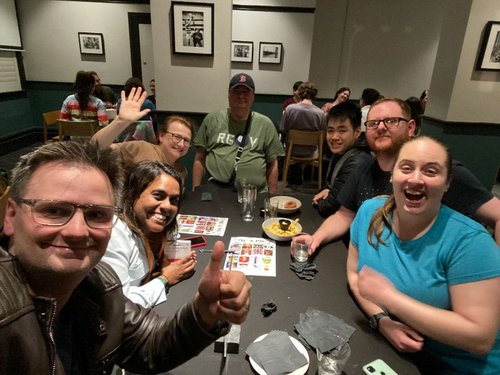
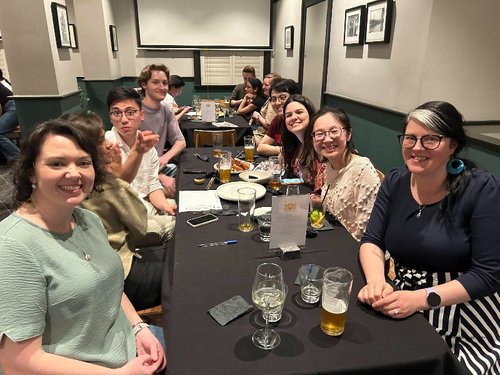
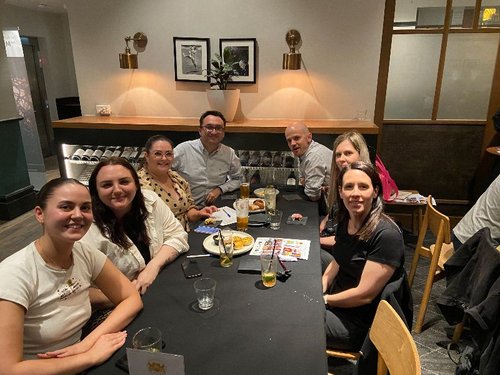
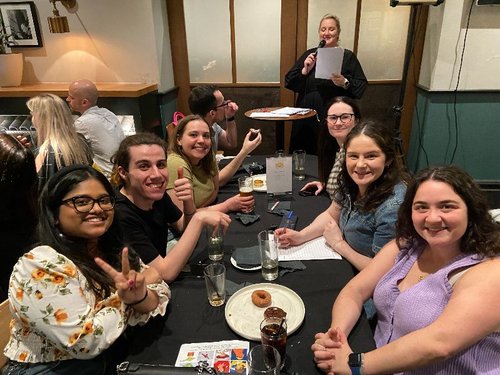
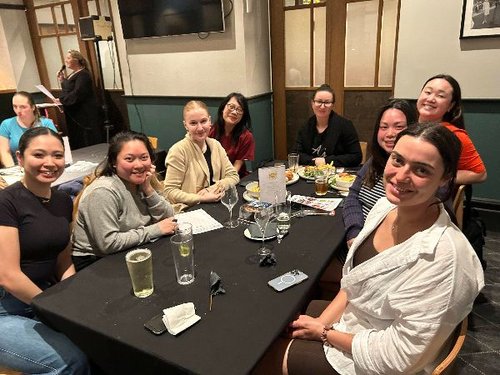
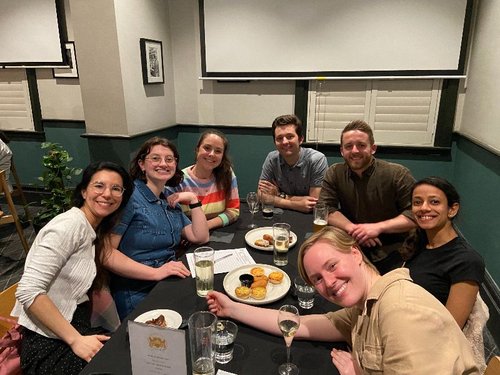
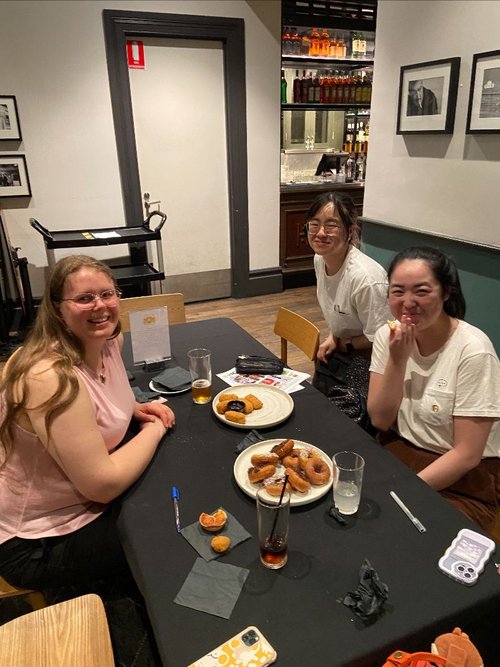
Public Health Night
Public Health Night 2023 was hosted by the ASM Victorian Branch and held at the Doherty Institute on Monday 28th August,2023. The event was chaired by Professor Ben Howden, Director of the Microbiological Diagnostic Unit Public Health Laboratory (MDU PHL). Presentations were delivered by five excellent speakers on four public health related topics from the Doherty Institute and the Victorian Department of Health to approximately 45 attendees. Special thanks to Jane Hawkey (Burnet Institute) and Jessica Gu (MDU PHL) for technical assistance on the night.
The speakers who presented were:
Local Public Health Units – expanding the Victorian public health network Dr. Christian McGrath (Vic DH) [Ms Nicole Hughes (Vic DH) in absentia]
Critical antimicrobial resistance in Neisseria gonorrhoeae Ms Kerrie Stevens (MDU PHL) and Ms Daneeta Henessey (Vic DH)
COVID-19 serosurvey Dr. Joshua Szanyi (Doherty Epidemiology)
Genomic characterisation of Mycoplasma genitalium in Victoria, Australia: exploring connections between lineages and epidemiological data Ms Francesca Azzato (VIDRL)• Certificate
ASM National Meeting
The annual ASM meeting occurred on July 3rd-6th at the Perth Exhibition Building. The conference showcased the research from microbiologists across the nation in fields ranging from molecular microbiology through to translation into the clinic. Throughout the conference many of our Victorian members were presented with awards and shared their work, including our Vic Branch Nancy Millis winner Sally Byers, our ECR oral presentation winner Dr Emily Gulliver, the ASM Distinguished Award Orator Prof. Dena Lyras, and the Rubbo Orator Prof. Julian Rood. Dr Gulliver also went on to receive the national ECR oral presentation award where she will receive a €500 prize from FEMs. Now it’s time to start planning for the next ASM in Brisbane 2024!
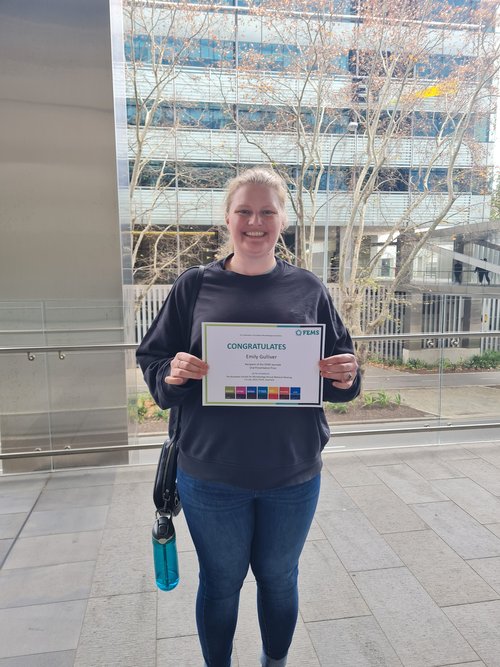
News From The Hospitals II
News from the Hospitals was well attended, both in person and online, with six interesting and informative presentations from Monash and Cabrini Hospitals, and Australian Clinical Labs. Infectious Diseases Consultant Dr Sadid Khan of Monash Health was an engaging chair, and bioMerieux was the sponsor for the evening.
The Early Career Microbiology Scientist Award was presented to Megan Van Es from Monash Health for her excellent presentation of a case study titled “A Cryptic Case of HIV”. The abstract describing her work can be read below:
A Cryptic Case of HIV
The patient presented to ED with a 2-day history of fever, headache, photophobia and neck stiffness and a 1-month history of weight loss. He had no past medical history or medications, no significant epidemiological risk factors and no illicit drugs but was sexually active. Routine pathology was found to be normal. Blood cultures were collected, and the patient was discharged from ED after declining a lumbar puncture. His blood culture flagged positive on day 3 with a suspected Cryptococcus in the gram stain. Serum cryptococcal antigen was negative on initial bloods before a positive result four days later with a titre of 1:10. On readmission, CSF was collected and grew Cryptococcus neoformans with an antigen titre of 1:20. All subsequent blood culture and CSF collections were negative for culture. HIV serology was performed and returned a positive result with a viral load of 1.8 million copies/mL and a CD4 count of 84. His diagnosis was advanced HIV with a crypotococcal AIDS-defining illness.
New cases of HIV in Australia are exceedingly rare at 0.1 per 1,000 uninfected individuals and advanced cases of HIV with AIDS progression even fewer given the access to anti-retroviral therapy. Individuals within the heterosexual risk-group more often progress to advanced cases, possibly due to less routine screening and public health campaign targeting.
Urinary Red Cell Morphology Workshop
On Saturday the 3rd of June 2023, a captivating collaborative ASM and AIMS event on urine microscopy took place at the Peter MacCallum Cancer Centre lecture theatre in Parkville Melbourne. The event held 94 attendees in person and provided comprehensive coverage of various aspects, including red cell morphology and examination of urine sediment. Renowned speakers shared their expertise throughout the day, starting with Dr. Jeffrey Susilo from Sysmex Asia Pacific, who discussed the role of automation in investigating Haematuria and the advancements Sysmex aims to bring to this field. Maureen Jacobson emphasized the importance of continued professional development through APACE accreditation during informative session. We also had a passionate presentation by Dr. Kathy Paizis, a respected Renal Physician, offered insights into renal presentations from a clinician's perspective, highlighting the impact of routine laboratory test results on her work and patient care.
Attendees enjoyed a lively Morning Tea break which also included a networking game that brought participants together to match their name tags featuring pictures of organisms. Retired principal scientist Dr. Peter Ward gave up his Saturday morning to enriched the minds of attendees further by sharing numerous examples of glomerular and non-glomerular red blood cells, focusing on assessing the red cell morphology.
The event concluded with medical scientist Patricia Szczurek from the Austin hospital, who explored various other elements found in urine, such as casts and crystals identification and significance. A fun quiz covering the day's topics added an element of excitement before attendees gathered for a well-deserved lunch. The detailed workshop provided valuable insight while contributing to APACE points for participants. Looking forward to attending the next one.
